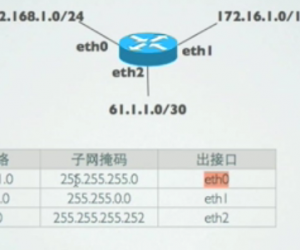浅析linux中的宏contianer_of
发布时间:2014-09-05 16:48:59作者:知识屋
container_of是linux中的一个宏,它的作用是通过结构体中某一成员的地址来获得该成员所在结构体的地址。其定义在include/linux/kernel.h中653行,如下所示:

下面对上述代码进行简单的介绍:对于第653行,该行定义了宏名,并且该宏包含三个参数:ptr用于存放结构体中某已知成员的地址;type用于指明该结构体的名称;member用于存放ptr所对应的成员在结构体中的名称。对于第654行,它的本质是定义了一个变量,并对其赋值。其中typeof是gcc对c语言的扩展保留字,用于获得变量的类型。此时该语句就不难理解:这里首先将强制转化为该结构体类型的指针,然后通过该指针指向相应的成员变量,接着再通过typeof获取该成员变量的类型。所以这行代码的意思就是定义一个与结构体成员变量member同类型的指针变量,并将ptr赋值给它。对于第655行,由于ptr存放的是结构体中某成员的地址,所以_mptr存放的也就是该成员的地址;offsetof用于获得结构体成员member相对于结构体起始地址的偏移量,所以该结构体的地址就应该为该成员变量的地址减去其相对于结构体起始地址的偏移量。
宏offsetof用于获得结构体中某一成员相对于结构体起始地址的偏移量。它定义在include/linux/stddef.h中第24行:

其中(TYPE *)0 是骗编译器说有一个指向该结构体TYPE的指针,其值为;&((TYPE *)0)->MEMBER用于获得结构体中成员变量MEMBER的地址,由于该结构体类型的变量的基地址为,此时MEMBER的地址就是其相对于结构体的偏移量;然后再将结果强制转化为size_t,其在标准c库中定义为unsigned int。
下面举例进行说明该宏的用法(由于该宏是在内核态定义的,用户态无法使用,这里将该宏的定义拷贝到用户态进行使用):
程序一:
#include <stdio.h>
#define offsetof(TYPE,MEMBER) ((size_t)&((TYPE *)0)->MEMBER)
#define container_of(ptr,type,member)({ /
const typeof(((type *)0)->member)* _mptr=(ptr); /
(type *)((char *)_mptr-offsetof(type,member));})
struct student{
char *num;
char *name;
int age;
};
int main()
{
struct student stu={"0001","zhang",10};
struct student *s=container_of(&(stu.name),struct student,name);
printf("name=%s,sex=%s,age=%d/n",s->num,s->name,s->age);
return 0;
}
程序二:
#include <stdio.h>
#define offsetof(TYPE,MEMBER) ((size_t)&((TYPE *)0)->MEMBER)
#define container_of(ptr,type,member)({ /
const typeof(((type *)0)->member)* _mptr=(ptr); /
(type *)((char *)_mptr-offsetof(type,member));})
struct student{
char num[5];
char name[10];
int age;
};
int main()
{
struct student stu={"0001","zhang",10};
struct student *s=container_of(stu.name,struct student,name);
printf("num=%s,name=%s,age=%d/n",s->num,s->name,s->age);
return 0;
}
对上述程序分别进行编译,其结果如下图所示,其中图一为程序一的编译结果;图二为程序二的编译结果。

图一 程序一的编译结果

图二 程序二的编译结果
分析:为什么程序二的编译会出现警告呢(上述警告的意思为指针赋值时类型不兼容)?原因很简单,下面分别将该宏展开如下所示:
程序一:
#define offsetof(struct student,name) ((size_t)&((struct student *)0)->name)
#define container_of(&(stu.name),struct student,name)({ /
const typeof(((struct student *)0)->name)* _mptr=(&(stu.name)); /
(struct student *)((char *)_mptr-offsetof(struct student,name));})
程序二:
#define offsetof(struct student,name) ((size_t)&((struct student *)0)->name)
#define container_of(stu.name,struct student,name)({ /
const typeof(((struct student *)0)->name)* _mptr=(stu.name); /
(struct student *)((char *)_mptr-offsetof(struct student,name));})
对于程序段一中的第三行,这段代码的意思是定义一个char类型的二级指针_mptr。因为student struct结构体中name成员为char类型的一级指针,通过typeof后便得到其类型,然后再定义一个指向字符指针类型的指针_mptr;接着将stu.name的地址赋值给_mptr。由于stu.name为字符指针类型,取地址后即为二级字符指针。综上知,编译时不会出现警告信息。
对于程序段二中的第三行,这段代码的意思也是定义一个char类型的二级指针_mptr。其中大部分都和程序段一中的相同,但在赋值时,由于stu.name为指向一个长度为10的字符数组的指针常量,所以类型不匹配,因此在编译时会产生警告信息。在该程序中,如果将container_of宏的第一个参数设置为&(stu.name),在编译时同样会出现上述警告。此时只需将该宏的第二行中的const关键字删除即可,删除后编译将不会出现警告。对于发生这种错误的原因现在我还不清楚,有待于以后的探究
摘自:拾月彷徨的博客
相关知识
-

linux一键安装web环境全攻略 在linux系统中怎么一键安装web环境方法
-

Linux网络基本网络配置方法介绍 如何配置Linux系统的网络方法
-
Linux下DNS服务器搭建详解 Linux下搭建DNS服务器和配置文件
-
对Linux进行详细的性能监控的方法 Linux 系统性能监控命令详解
-
linux系统root密码忘了怎么办 linux忘记root密码后找回密码的方法
-
Linux基本命令有哪些 Linux系统常用操作命令有哪些
-
Linux必学的网络操作命令 linux网络操作相关命令汇总
-

linux系统从入侵到提权的详细过程 linux入侵提权服务器方法技巧
-

linux系统怎么用命令切换用户登录 Linux切换用户的命令是什么
-
在linux中添加普通新用户登录 如何在Linux中添加一个新的用户
软件推荐
更多 >-
1
 专为国人订制!Linux Deepin新版发布
专为国人订制!Linux Deepin新版发布2012-07-10
-
2
CentOS 6.3安装(详细图解教程)
-
3
Linux怎么查看网卡驱动?Linux下查看网卡的驱动程序
-
4
centos修改主机名命令
-
5
Ubuntu或UbuntuKyKin14.04Unity桌面风格与Gnome桌面风格的切换
-
6
FEDORA 17中设置TIGERVNC远程访问
-
7
StartOS 5.0相关介绍,新型的Linux系统!
-
8
解决vSphere Client登录linux版vCenter失败
-
9
LINUX最新提权 Exploits Linux Kernel <= 2.6.37
-
10
nginx在网站中的7层转发功能
























